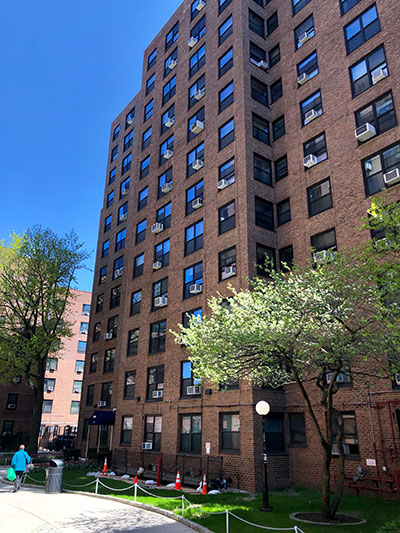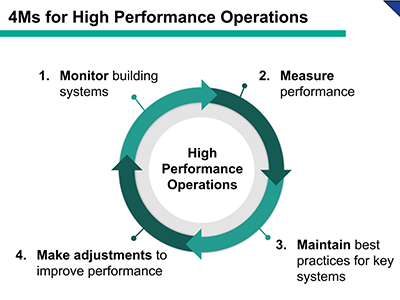Clinton Hill Cooperative
Kings County

Comprehensive Training Creates a Culture of Energy Efficiency at Clinton Hill Cooperative
Urban Green Council and the O&M staff of Clinton Hill Cooperative create and implement an energy efficiency training program.
Clinton Hill Cooperative is a 12-building co-op complex built in 1944, with two “campuses” situated along Clinton Avenue in the Fort Greene neighborhood of Brooklyn. In order to comply with New York City’s ambitious building emissions law, Local Law 97, Clinton Hill needed to implement energy efficiency upgrades throughout their buildings. To achieve the upgrades, the project team sought to create a culture of training and energy efficiency among the operations and maintenance (O&M) staff.
Clinton Hill partnered with Urban Green Council, a nonprofit dedicated to decarbonizing buildings, educating building professionals, advancing electrification, and analyzing NYC building data. With input from Clinton Hill’s O&M staff, and funding from NYSERDA, they created an in-depth energy efficiency training plan. The plan would ensure staff had the skills they wanted and needed to be as effective, efficient, and energy conscious as possible.
Needs Assessment
In order to diagnose building problems and identify areas for energy reduction, Urban Green Council started by surveying and interviewing the O&M staff. The survey was designed to (1) gauge staff interest in sustainability; (2) learn about current skills and knowledge; and (3) find out which types of courses and certifications would be most beneficial.


Part of the Clinton Hill complex.
SNAP SHOT:
Clinton Hill Cooperative
- 12 buildings
- 1.4M+ square feet
- 42 staff members trained
- 3 months of training sessions
PROGRAM:
- Building Operations and Maintenance
- Workforce Development and Training Program
Of the surveyed staff:
90%
Believe that environmental sustainability is essential for buildings & maintenance.
79%
Believe that they can impact the sustainability and efficiency of their building through their job.
62%
Were very interested in learning more about environmental sustainability and energy efficiency in buildings.
The survey also confirmed that O&M staff needed a wide range of skills to perform their jobs effectively. And, staff were interested in upskilling in heating and cooling, indoor air quality, and improved communication, with a focus on hands-on training opportunities.
A Collaborative, Comprehensive Plan
Urban Green Council and Clinton Hill then built a comprehensive and customized training plan. The plan ensured that any identified skills gaps were addressed and filled.


4Ms as taught in the “GPRO Operations and Maintenance Essentials” course.
4Ms for High Performance Operations
- Monitor building systems
- Measure performance
- Maintain best practices for key systems
- Make adjustments to improve performance
Specific trainings included:
- Urban Green Council’s Training course, “GPRO Operations and Maintenance Essentials” – GRPO courses teach people who build, renovate, and operate buildings how to integrate high-performance practices and incorporate systems thinking. This class provided building O&M staff with knowledge and skills to improve building performance, make buildings sustainable and healthy, and reduce operating costs.
- Supervisor Training –Provided supervisors with a comprehensive understanding of new energy efficiency tools, and the skills to effectively train their staff.
- Staff Tool Training – Provide hands-on training to staff to help them use new energy efficiency tools and equipment effectively.
- Boiler Operations Training & Maintenance Seminar – Provide in-depth boiler operations and maintenance training.
- Effective Communication Skills – Provide training to help building O&M staff communicate effectively with their teams, and with residents.
Tools, Too
- This project included funding for new diagnostic tools for the Clinton Hill facilities team in support of short- and long-term energy management goals. The tools purchased equate to a $4,000 value for Clinton Hill Coops.
- Staff on the North and South campuses regularly use these diagnostic tools to evaluate building performance during the normal course of their workday.
Tools and Resources Funded Through Project
- Light Meter: To assist with lighting upgrade projects
- Personal CO Detector: For safety
- VOC Detector: To check for presence of low levels of contaminants
- Moisture Detector: To check for mold
- Infrared Camera: To assist with weatherization projects
- Sound Measuring Device: To check for leaks
- Datalogging Devices: To support accurate data collection on different building characteristics
Success Story
Residents on the 15th floor of a building were experiencing excessive heat. The facilities team used new infrared camera phone attachments to identify an uninsulated pipe in the wall. This diagnostic tool helped identify the pipe as a contributing factor to the overheating issues.
The Action Plan, the Results
“The project was an amazing educational experience that helped the development of the staff.”
–Parvez Ahmed, Building Management
Staff completed all relevant training based on their respective roles, previous activities, training plan recommendations, and professional development goals, all with an eye toward building and cultivating a culture of energy efficiency at Clinton Hill.
Each staff training focused on the needs and job requirements of the Clinton Hill staff, provided relevant and high-quality technical content, and incorporated hands-on exercises and demonstrations where applicable. As a result, staff now have a “common language” and a shared set of best practices to draw on that are enabling them to foster an energy efficiency mindset across Clinton Hill, among staff, and even among residents.
Wrapping Up
Employees were encouraged to take accountability and pride in their critical role, fostering a positive learning environment and contributing to business success.
As a result of this training program, the staff is working more collaboratively with the Clinton Hill Board to develop and support long-term sustainability initiatives.
Staff now are energized to engage with tenants and this culture shift has significantly improved communication with the community. The team will continue to hold meetings to introduce a tenant engagement strategy.
Learn more about NYSERDA's Building Operations and Maintenance efforts.
Visit: nyserda.ny.gov/BOM or email: [email protected] for information.
